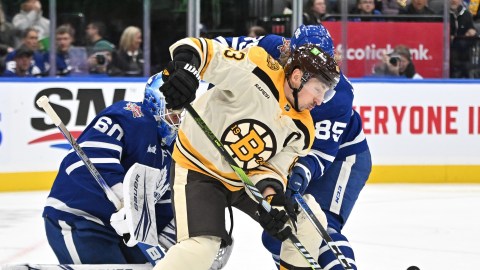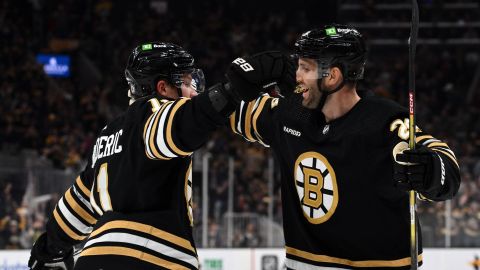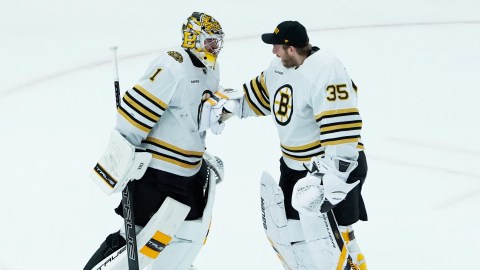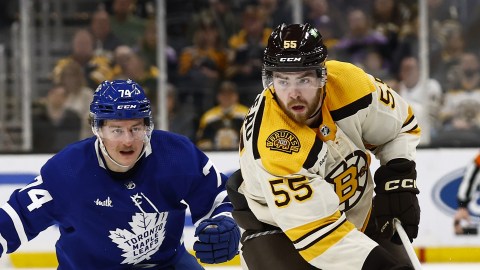Ted Williams or Bobby Orr? Bill Russell or Larry Bird? Boston’s Biggest Sports legend competition is coming down to the wire. There are no easy choices, but here’s a look at how the four legends stack up against each other.
#gamma {display:none;}#delta {width:958px;border:none;}
.story-category-header {display:none;}
#delta .story table img {padding:0;border:5px solid #005596;}
#delta .story table {font-weight: normal;}
#delta thead td, #delta thead th {text-align: center;}
#delta .delta-ad-300 {margin-left:340px;}
| Category | Bill Russell | Larry Bird | Bobby Orr | Ted Williams | Advantage |
|---|---|---|---|---|---|
| Rings | To put it simply, Bill Russell is the greatest winner in the history of basketball’s winningest franchise. He has 11 championship rings, with an Olympic gold medal and two NCAA championships to boot. | Larry Legend made his name by performing his best when it mattered most. Of his three championship rings, the one that meant the most was the one he earned in 1984, when the C’s beat the Lakers for the crown and Bird averaged 27.4 points and 14.0 rebounds during the series. | Bobby Orr led the Bruins to a pair of Stanley Cup championships in 1970 and 1972 — scoring the series-clinching goal in both. Orr also led Boston to the 1974 Stanley Cup Finals, but they lost to the Philadelphia Flyers in six games. | Ted Williams never won a World Series ring, but he had one chance on the big stage. Unfortunately, the then-27-year-old hit just .200 (albeit with a .333 on-base percentage) in the 1946 Fall Classic against the St. Louis Cardinals. | Bill Russell. After the Bulls won three straight NBA titles in the 1990s, someone asked Russell what he thought. “Not much,” he said. Winning 11 rings in 13 years raises the bar. |
| Honors | Russell was not concerned with individual awards, but he was a five-time NBA MVP and 12-time All-Star. There was no Finals MVP during his championship run, but fittingly, that award was named in his honor in 2009. | The Hall of Famer was inducted in 1998. Bird also appeared in 12 consecutive All-Star games from 1980 to 1992, won Rookie of the Year after the 1979-80 season, was the All-Star Game MVP in 1981-82, earned Finals MVP honors in 1984 and 1985, and was named MVP of the league three times (1984, 1985, 1986). Bird also made nine appearances on the All-NBA first team. | The eight-time First Team All-Star’s string of career awards began with the Calder Memorial Trophy in 1967. He earned the James Norris Trophy every year from 1968 to 1975. He also grabbed the Art Ross Trophy in 1970 and 1975, to become the only defenseman to ever lead the league in scoring. Orr was the NHL’s plus-minus leader six times (from 1969-72, 1974 and 1975), which is the most in history, and he was the recipient of the Hart Memorial Trophy from 1970-72. | Ted Williams took home two MVP awards and finished in the top five nine times. Only one year — when he had a total of 12 plate appearances in 1952 — did he not receive MVP votes. He was so influential in the game that he received a 26th-place vote in MVP voting in 1953 despite playing just 37 games. | Bobby Orr. All the Hall of Famer did was revolutionize hockey. When is the NHL going to name an award after him? |
| Longevity | Russell won an unprecedented 11 championships in 13 seasons. You could call that productive, or you could call it unbelievable. In just 13 years, he established his legend as one of the best players of all time. | Bird was drafted by the Celtics in 1978 and spent his entire career in green, retiring after the 1991-92 season. In the process, he redefined the legacy of the Boston Celtics by garnering three championships during his reign. What Bostonians remember as the glory days for the Celtics wouldn’t have existed without Bird. | Orr played just 12 seasons and 657 games, starting in the 1966-67 season and concluding after the 1978-79 season in Chicago – his second campaign with the Blackhawks. His Bruins career ended after an injury-plagued 1976 season that limited him to just 10 games. | Ted Williams played 19 seasons (1939-60), and could have played more if not for missing three full seasons (1943-45) due to World War II. He is one of three players to steal a base in four decades. But Teddy Ballgame’s calling card was his ability to take a walk (2,021 career free passes). That proclivity eventually spawned the game’s emphasis on taking a walk. | Ted Williams. He lived, ate and breathed hitting. And he only batted less than .300 one season in his career. |
| Heart and soul | Russell battled racism throughout his entire career, getting overlooked for collegiate player of the year when he was the obvious choice. That changed his focus to become a team player above all else, disregarding individual glory. | For Bird, a game was never over until the buzzer sounded – and that gritty determination helped him achieve perhaps his biggest highlight-reel moment ever. Against the Pistons in the 1987 Eastern Conference finals, the Celtics were down by a point in Game 5 at the Garden. A Boston loss would have given Detroit the chance to close the series at home in Game 6. Isaiah Thomas had the ball in the closing seconds and was prepared to make an inbounds pass, but Bird caught him looking at center Bill Laimbeer – and cut into the passing lane and stole the pass, regained his balance despite almost falling over the baseline, and passed to Dennis Johnson as he cut to the hoop. DJ laid it in with one second left, giving Boston the 108-107 win. | Orr battled through over a dozen knee surgeries in his lifetime, as his rickety knees were his Achilles’ heel. Despite those long, grueling seasons, Orr never shut it down come playoff time, as he bagged 92 points in 74 career postseason games for the Black and Gold. To boot, the smooth-skating goal-scoring machine would never back down from a fight – he was a true Bostonian through and through. | Ted Williams didn’t let his love for baseball get in the way of his patriotic duty. He enrolled to become a pilot and taught cadets in World War II before flying 39 combat missions in the Korean War. | Larry Bird. His will to win was an 11 on a 1-10 scale. Even Lakers legend Magic Johnson wanted to be his friend. |
| Moment of immortality | Russell made it clear that he was a big-time performer in his very first playoff game. Against the Syracuse Nationals, he scored 16 points … and hauled in 31 rebounds. | Bird cemented his legendary status when the Celtics won the championship in 1984, beating the Lakers in seven games. Not only was Bird named Finals MVP that year, he was also named the league’s most valuable player, the first of three consecutive years winning the award. | Two words: The Goal. According to Bruins winger Shawn Thornton, the famous image from Orr’s game-winning goal in the Stanley Cup finals is hanging in every man cave across Canada. After his retirement, the NHL waived the mandatory three-year waiting period for induction into the Hockey Hall of Fame (only 10 others have been given the honor), and he was enshrined at age 31. | Ted Williams hit .406 at age 22, but the Splendid Splinter become a legend at age 41 by hitting a home run in his final at-bat for the Red Sox. John Updike immortalized the event, as well as Williams’ refusal to tip his cap to fans at the game at Fenway Park who wanted to give him a send-off. Said Updike: “Gods do not answer letters.” | Bobby Orr. They should hang up a picture of Orr flying through the air in the Smithsonian. |
| Humanity | A longtime rival of Wilt Chamberlain, Russell could relate to the competitive animosity that grew between Shaquille O’Neal and Kobe Bryant after the former left L.A. Russell helped smooth over the relationship, proving that when Bill Russell talks, even superstars listen. | Despite his dislike for Hollywood’s favorite team, Bird was always around to lend a helping hand when the big screen came calling. Bird made himself available for cameos in a variety of basketball-centric films, including Space Jam and Celtic Pride. | Although he kept his life off the ice very private, Orr always made time to help out the community and never turned down an autograph, handshake or friendly conversation. The legend even donated a rink in his hometown of Parry Sound, Ontario — the Bobby Orr Community Centre. | Ted Williams didn’t have many soft spots in his heart, but one was for children afflicted with cancer. His work with the Jimmy Fund — both during and after his playing career — was so remarkable that the statue of The Kid outside Fenway is not of him swinging a bat, but giving a young Jimmy Fund child his ballcap. | Ted Williams. The Jimmy Fund has saved a lot of lives, and Williams was one of its biggest proponents before anyone knew about the charitable foundation. |
| After the game | Russell was a once-in-a-lifetime player, so it’s not surprising to learn that he had trouble getting players to follow his philosophies as a coach. He went 162-166 as coach of the Seattle Supersonics and 17-41 as coach of the Sacramento Kings. | Bird worked for the Celtics as a special assistant from 1992 to 1997 before becoming head coach of the Pacers. In his first season in Indiana, Bird compiled a franchise-best 58-42 record, earning Coach of the Year honors and becoming the first person in NBA history to win an MVP and Coach of the Year award. Bird resigned as head coach after the 2000 season and returned to the team in 2003 as the president of basketball operations. | After retirement, Orr served briefly as an assistant coach for Chicago, and as a consultant to the NHL and the Hartford Whalers, spending the bulk of his retirement years as a Boston-area bank executive. He later became a hockey agent in 1996, purchasing the agency founded by Bob Woolf. Orr Hockey Group is a Boston-based, player-agent group that is majority-owned by Orr. The company was incorporated in February 2002 and includes players Jason Spezza, Eric Staal, Cam Ward and Jeff Carter as clients. | Ted Williams mentored Carl Yastrzemski in hitting, then took a position with the Washington Senators as manager from 1969 to 1972 (winning Manager of the Year in his first year). Williams then became an avid fisherman and was named to the International Game Fish Association Hall of Fame in 2000. | Ted Williams. Was there anything Teddy Ballgame couldn’t do? He makes The Most Interesting Man in the World look boring. |
| Believe it or not | Russell has become synonymous with the word “Celtics,” but he was originally drafted by the St. Louis Hawks. Red Auerbach targeted Russell, though, and acquired him by sending Ed Macauley and Cliff Hagan to St. Louis. | Red Auerbach had his sights set on Larry Bird much earlier than everyone else, drafting the 6-foot-9, 220-pound junior sixth overall in 1978. Although Bird opted to stay at Indiana State for his senior season, the Celtics retained exclusive rights to sign him until the 1979 draft. Auerbach and the Celtics signed Bird for $650,000, making him the highest-paid rookie in the history of the NBA at the time. | Besides bagging the Stanley Cup in 1970, Orr also captured the Norris Trophy, Art Ross Trophy, Hart Trophy, and Conn Smythe Trophy, becoming the first player in history to win four major NHL awards in one season. | During Ted Williams’ Hall of Fame induction speech in 1966, he expressed hope that players from the Negro Leagues could one day be a part of the Hall of Fame. Williams’ comment is credited with being the impetus toward including Negro League stars in Cooperstown. | Bill Russell. If it weren’t for Red Auerbach’s prescience, St. Louis might still have a basketball team – and more NBA championships than any other city. |
| Quote marks | Felton is Russell’s middle name, but it might as well be Intimidation. He set a standard on defense for others to follow. “The idea is not to block every shot. The idea is to make your opponent believe that you might block every shot.” | Bird gave new meaning to the word confident. In 1986, prior to an appearance in the 3-point contest during All-Star Weekend, he famously walked into the locker room and said, “I want all of you to know I am winning this thing. I’m just looking around to see who’s gonna finish up second.” And he won. | At the unveiling of “The Goal” statue outside the TD Garden, Orr’s reaction summed up who he is: “When I arrived here from Parry Sound, Ontario, I really didn’t understand what the Bruins meant to the citizens of Boston and all of New England. Neither did I realize how completely our fans would embrace us once we became part of the Bruin family. That reaction from all of our wonderful fans and the loyalty and support made playing for the Bruins very, very special. This specific moment and time we celebrate with this statue is something we can all now nostalgically remember with fondness, together, each time we enter Boston Garden. To all of you, thank you very much from the bottom of my heart. I’m honored. Guys, thank you.” | Ted Williams was larger than life in just about everything he did. “A man has to have goals — for a day, for a lifetime — and that was mine, to have people say, ‘There goes Ted Williams, the greatest hitter who ever lived.” | Larry Bird. The Hick From French Lick didn’t invent trash talk, but he perfected it. |
| Legacy | Russell’s relationship with Boston and the media was tenuous, but he’s embraced the city in recent years. Needless to say, the greatest champion the city’s ever known has been welcomed with open arms by a city that will always remember him as a pure winner. | Winning was, above all, the most important thing to Larry Bird. His stat line meant little – same goes for his relationships with his competitors. Bird wasn’t interested in keeping it cordial with the guys on the opposite bench, especially if they were wearing purple and gold. His tunnel vision was always focused on earning another ring, and it is that drive and focus that helped him redefine what it meant to wear green. | Orr collected more than 100 points in each season from 1969 to 1975. He will go down as the pioneer of two-way hockey, an many believe Orr is the greatest hockey player to ever put on a pair of skates. “Losing Bobby,” hockey legend Gordie Howe once said, “was the greatest blow the National Hockey League has ever suffered.” | Ted Williams is remembered as he wanted to be: one of the greatest hitters who ever lived. While he never got a ring, that was more a function of the players around him. Williams’ hitting exploits are nothing short of remarkable, and place him in very rare group. | Push. Picking who’s the greatest in Boston sports lore is like picking who’s the most important figure in American history. |
Boston has been blessed with sports legends. But there can only be one winner. Choose wisely.



